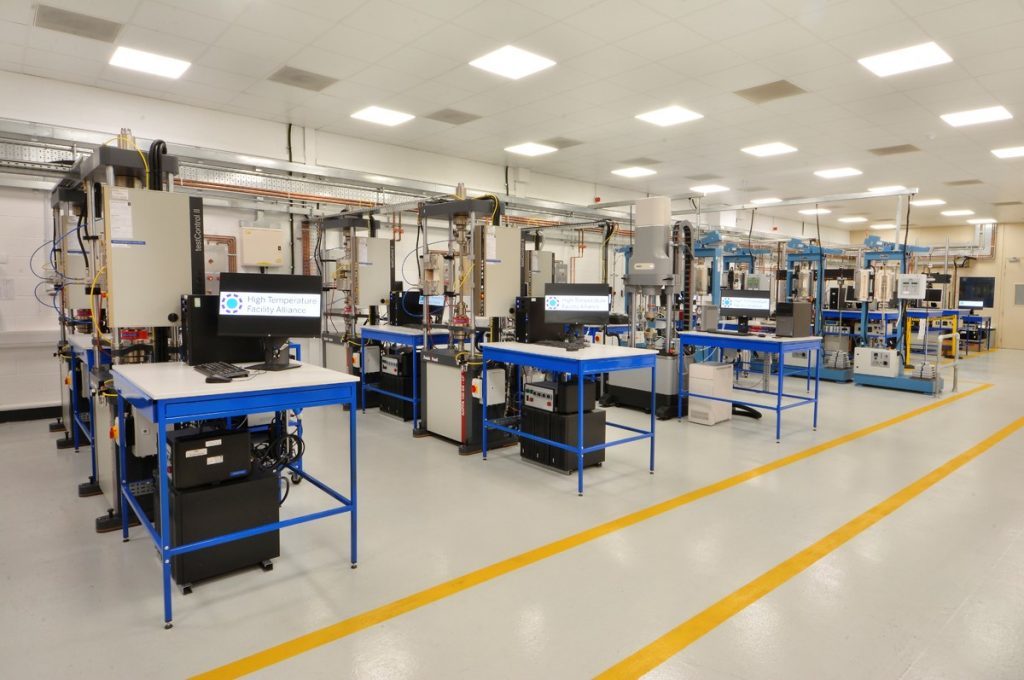
Amec Foster Wheeler opened a new High Temperature Facility (HTF). Here’s a breakdown of what the hub can do, who will fund it and what the benefits are.
Q – What does the HTF offer?
A – The HTF is a unique testing facility offering rigs capable of testing materials at temperatures up to 1000°C and with temperature cycling in a range of novel, demanding environments; pressurised gas for VHTR/HTR, liquid metal for SFR/LFR, inert atmospheres. In addition to the testing capabilities, the HTF offers the combined knowledge and experience of the HTF alliance partners. The HTF Alliance is designed to drive and support research in nuclear applications, in particular looking forward to Generation IV reactor designs which will follow on from the current nuclear new build programme.
Q – Who is in the HTF alliance?
A – The HTF alliance members are Amec Foster Wheeler, UKAEA, EDF Energy, Imperial College London, National Nuclear Laboratory, The Open University, University of Bristol, University of Manchester, University of Oxford and URENCO UK Ltd.
Q – Who will benefit from the HTF?
A – The key sector that will benefit from the testing capabilities of the HTF is nuclear, but successful projects will also be delivered in other sectors requiring high temperature testing of materials, especially in novel, demanding environments.
Q – Who can use the HTF?
A – The HTF is an open access research facility available for industrial and academic research organisations looking to investigate, develop and advance structural materials technology for future systems applications such as Generation IV nuclear reactors, nuclear fission, nuclear fusion, advanced gas turbine materials and other advanced energy concepts.
Q – Where is the HTF?
A – The HTF is located at Birchwood Park, Warrington, UK within the Amec Foster Wheeler Technology and Innovation Centre.
Q – What is special about the equipment in the HTF? What can the HTF do that other high temperature laboratories cannot?
A – The testing equipment has been designed to operate at 1000°C, which is higher than usual for nuclear applications. The current high temperature AGR fleet in the UK operates at temperatures up to 650°C, but future Generation IV designs include temperatures up to ~1000°C to improve efficiency. Operating at 650°C is now routine and the methods for such testing are well established.
Operating at 1000°C has particular requirements, in terms of heating equipment and instrumentation. However, the key difference is in the provision of mechanical testing in appropriate environments, like pressurised gases, and with some capability for testing in liquid metals. Whilst these are critical environments for advanced nuclear reactors, there is also overlap with other industries, for example gas turbines.
The HTF can simulate relevant environments for differing applications. This aspect of mechanical testing is becoming more widely recognised as important for correctly simulating service conditions in a range of industries, especially as plant operating temperatures increase to take advantage of improved thermal efficiencies. Initially therefore, the HTF is developing a capability to test mechanically in pressurised gaseous environments, such as CO2 and helium, in support of the UK’s advanced gas-cooled reactors (AGRs) and Generation IV high temperature reactor concepts. This pressurised gas example also highlights the potential for cross-sector collaboration because environmental conditions in some gas turbines are similar.
The HTF’s capabilities are also applicable to other Generation IV reactor environments including liquid sodium and lead (and lead-bismuth) and supercritical water, including the ability to balance these potentially aggressive environments by testing under vacuum conditions (or inert gas) to establish the level of environmental impact on material deformation or fracture behaviour.
Q – What will it cost to use the HTF?
A – Costs will be established on a case by case basis, as such testing programmes tend to be bespoke. There will be the option for organisations to hire rigs with basic levels of support, if they have suitably qualified and experienced people of their own to operate the rigs safely, or to request assistance from the HTF Alliance.